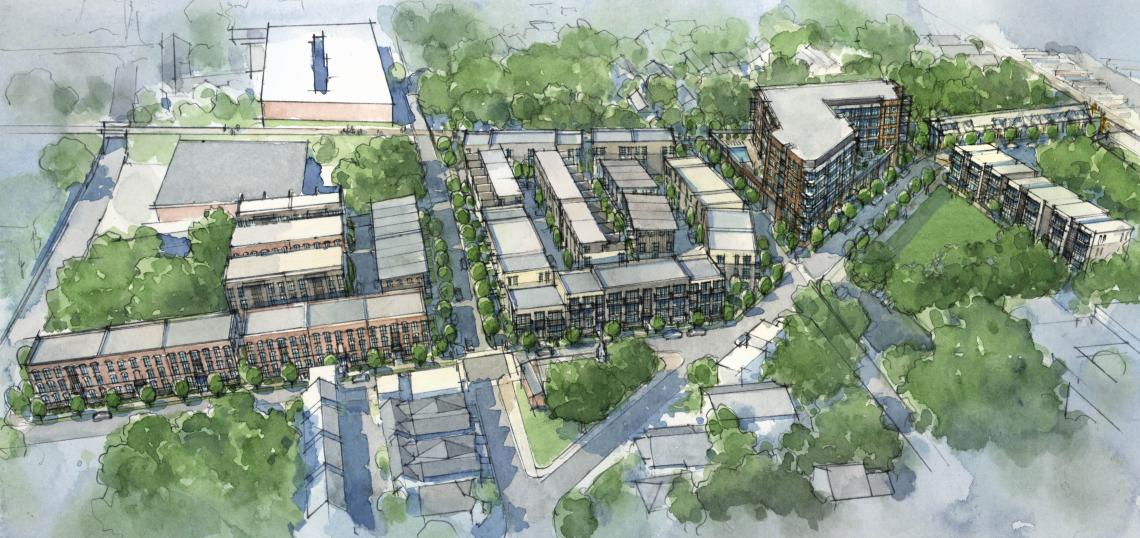Christopher Leerssen can sense a change coming in Reynoldstown. It’s been quieter in the afternoons—strangely quiet.
Leerssen, an architect and homebuilder, is a Reynoldstown Civic Improvement League board member who recently handed over the reins as local NPU chair. He’s lived in the neighborhood for years and knows what its generations-old metals manufacturer, Stein Steel, meant to the community, and how different the area will be once its industrial operations cease.
“It’s the end of an era, as they’re shutting down [instead of relocating],” says Leerssen. “The business is 98 years old, in that very spot.”
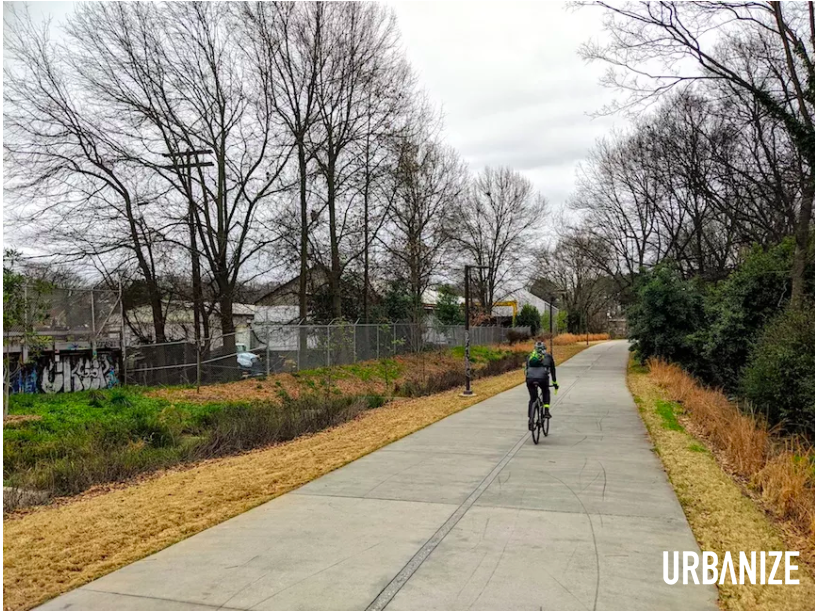 Stein Steel's Eastside Trail frontage, as seen in winter. Josh Green/Urbanize Atlanta
Stein Steel's Eastside Trail frontage, as seen in winter. Josh Green/Urbanize Atlanta
Two years ago, as the company’s leader approached retirement age, Stein Steel brought its property along Reynoldstown’s northwestern rim to market: 6.5 acres total, with a community park on one side and 900 feet of the Atlanta BeltLine on the other, which for developers looked no less appetizing than a steamy buffet of filet mignon.
Brokers called it a generational opportunity—one of the largest tracts left on the Eastside Trail, the equivalent of “beachfront” property in Atlanta.
Bert Stein, the company’s president, received a whopping 35 proposals from different developers eager to purchase the land and remake it. From those, Stein picked plans compiled by homebuilder Empire Communities, a company with roots in Canada that’s slowly spread across the Southeast and Texas the past 25 years, with more explosive growth recently across intown Atlanta.
Stein felt Empire’s “reputation, plans, and overall desire to work with the neighborhood” made them the best pick, he tells Urbanize Atlanta.
As the sale of Stein Steel to Empire nears for an undisclosed price—rumor has it about $3 million per acre is the right ballpark—Empire officials shared tentative plans for a property they consider a “trophy” in their growing portfolio. The project, expected to break ground this summer, will continue the Eastside Trail’s insatiable, decade-long development boom and change the feel of a historic intown community.
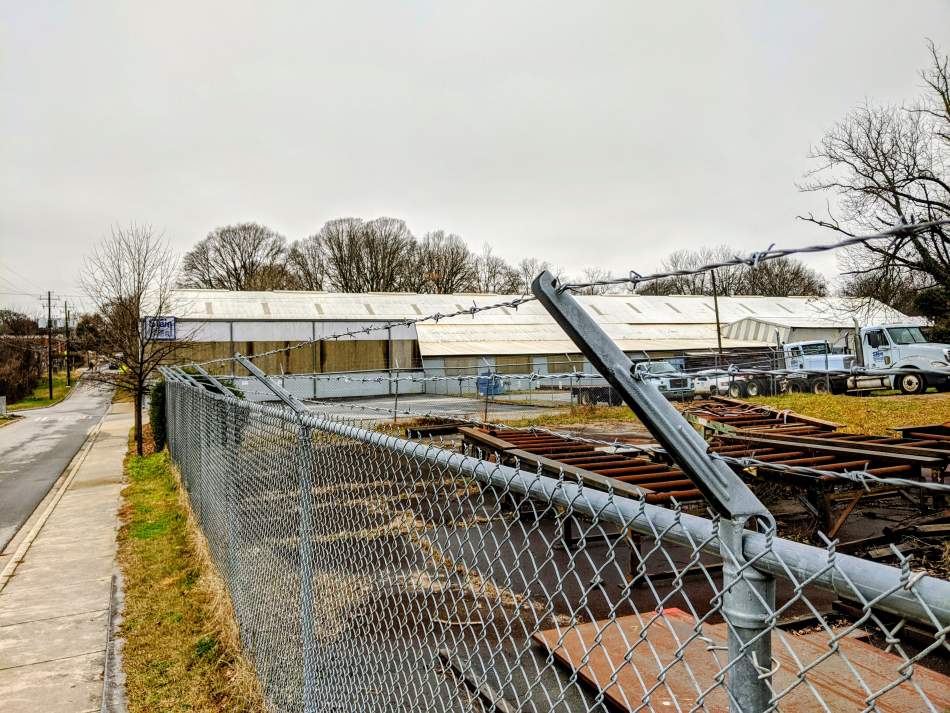 Kirkwood Avenue fencing at Stein Steel. Josh Green/Urbanize Atlanta
Kirkwood Avenue fencing at Stein Steel. Josh Green/Urbanize Atlanta
Stein Steel and Supply company has manufactured structural steel and provided fabrication services in formerly blue-collar Reynoldstown for generations, but their property took on a new shine in 2017 when the paved multiuse path opened next door.
While selling it, broker’s noted the site’s potential density could exceed 2 million square feet, totaling development roughly the size of Ponce City Market. But Empire’s proposal, as Leerssen notes, was less dense than others, which made their initial ideas appealing to the neighborhood.
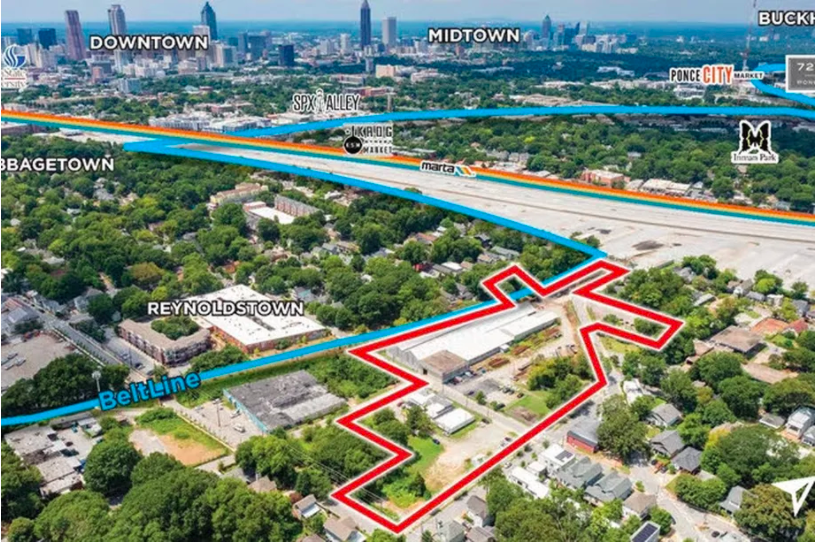 The collective 6.5 acres marketed as Reynoldstown's BeltLine riviera two years ago. Cushman & Wakefield, 2019
The collective 6.5 acres marketed as Reynoldstown's BeltLine riviera two years ago. Cushman & Wakefield, 2019
Empire officials say the site’s blocks will be divided into three distinct districts—the Milltown, Modern Hybrid, and Modern districts—denoted by different architecture styles referencing Reynoldstown’s character and the site’s industrial history.
Within the districts will be 276 residential units, all of them for sale.
Expect an array of product types, from small one-bedroom condos to three-bedroom townhomes similar to other Empire communities, which now span from East Lake to the Westside and Buckhead.
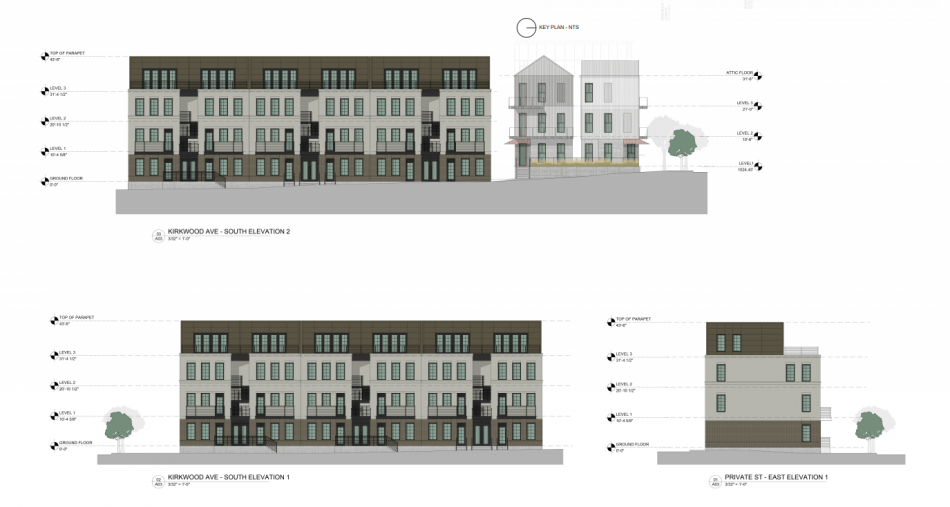 Proposed facades along Kirkwood Avenue, a BeltLine access point, echo existing Reynoldstown housing.Courtesy of Empire Communities
Proposed facades along Kirkwood Avenue, a BeltLine access point, echo existing Reynoldstown housing.Courtesy of Empire Communities
As for pricing, Saba Loghman, Empire’s director of acquisitions, says stacked condos and townhomes should deliver in the $300,000s to $500,000s.
Pricing for units in a mid-rise building planned for the site’s northern end, near Wylie Street, is less predictable “as costs and lumber are rapidly increasing right now,” Loghman says. But the range should be roughly from the $400,000s to $800,000s, to include live-work units on the ground floor fronting the BeltLine.
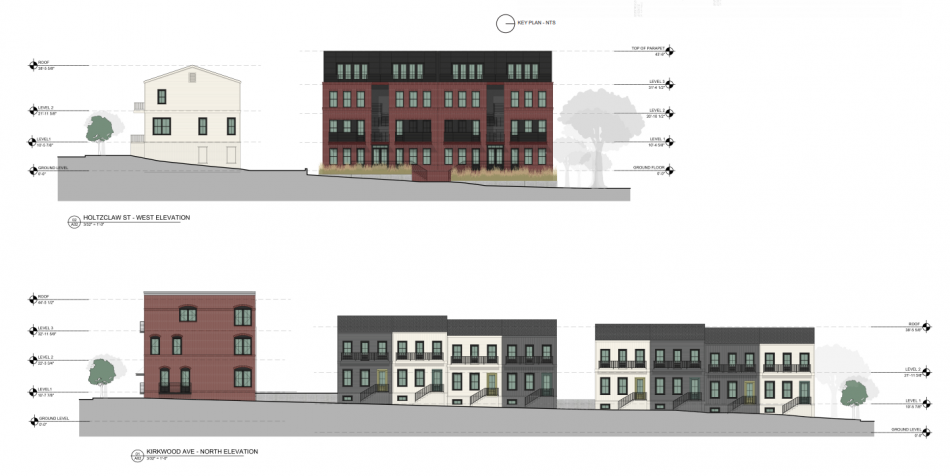 Elevations for different housing types proposed along Holtzclaw Street and Kirkwood Avenue. Courtesy of Empire Communities
Elevations for different housing types proposed along Holtzclaw Street and Kirkwood Avenue. Courtesy of Empire Communities
Also on that northern end, plans call for the lone non-residential component: an 8,000-square-foot restaurant with an outdoor section along the Eastside Trail, as developed by former Paces Properties principal Merritt Lancaster, now of Bridger Properties, whose past work includes Atlanta Dairies and Krog Street Market.
All told, the project will represent the largest for-sale residential project on the Eastside Trail to date. More than 16 neighborhood meetings have been held to gather community feedback, Empire reps noted.
One public-accessible facet will be incorporated near the project’s mid-rise building, where Empire is donating a half-acre to serve as an expansion of Lang-Carson Park, as required by the city to offset some density. About 15 townhomes are planned to front it.
“The [park] plans look good, and their talk is great,” says Leerssen. “We’re just hopeful that they honor our handshake, that it’s space we’re all happy about.”
Empire expects the R-town housing to start delivering in the third quarter of 2022. The community's official name is still being worked out.
Overall, the project will aim to create “a sustainable environment that pays homage to the legacy of Stein Steel,” with material from the facility repurposed and showcased throughout, according to Empire reps. The team of architects and engineers on board includes familiar names Smith Dalia, Lord Aeck Sargent, and Square Feet Studio, among others.
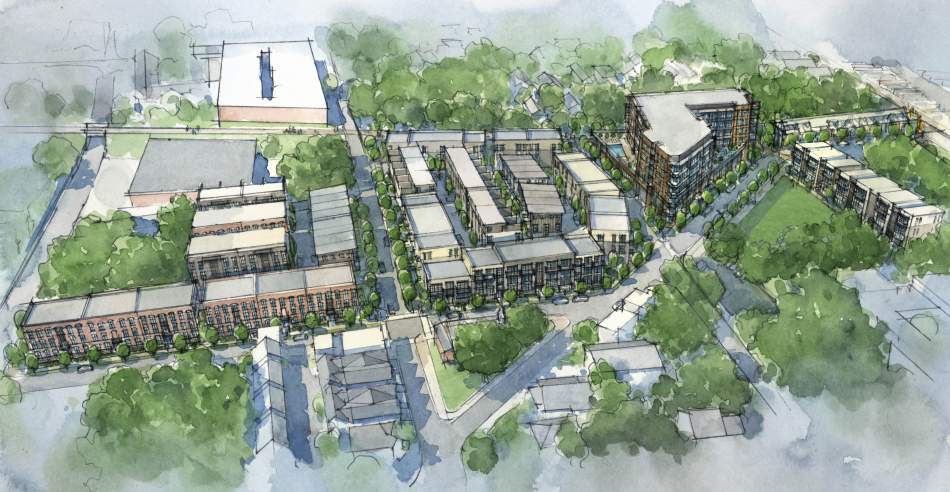 This updated overview shows Empire's three planned districts with the expanded park, multifamily building, and restaurant structure at far right. Courtesy of Empire Communities
This updated overview shows Empire's three planned districts with the expanded park, multifamily building, and restaurant structure at far right. Courtesy of Empire Communities
The steel company, founded in 1923, has been an “integral part of Reynoldstown” for generations, as Stein put it.
Among its recent projects, Stein provided the steel framing for Atlanta Dairies’ nearby music venue, the Atlanta Hawks practice facility, part of Tyler Perry Studios at Fort McPherson, and Leerssen’s own Mattie Branch community in Reynoldstown.
“While we'll truly miss our neighbors,” Stein said, in a prepared statement, “I’m confident Empire’s community concept will benefit and bring excitement to the immediate area and our friends along the Atlanta BeltLine.”
• Luxury condos at doorstep of BeltLine's Eastside Trail are a go (Urbanize Atlanta)





